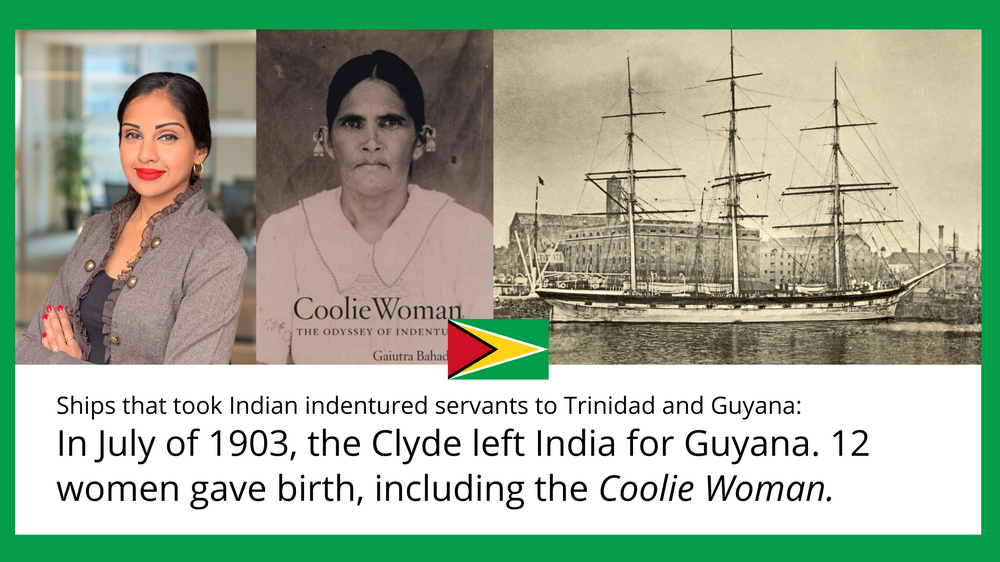What ships transported Indian indentured servants to Trinidad & Guyana? The Clyde (July 1903)
By: Melissa D. Goolsarran Ramnauth, Esq. | Trademark & Business Attorney for the U.S. & Caribbean Diaspora

The Clyde is one of the ships that came from India to Trinidad and Guyana with Indian indentured servants.
The Clyde first launched on July 25, 1894, and was primarily used for the transportation of Indian indentured servants to the British colonies.
Nine years later, in July of 1903, the Clyde also journeyed to Guyana. July was supposedly the worst month to leave India because of the monsoons. We do not know many details of this trip because the British Colonial Office destroyed the report.
However, some information about the Clyde’s 1903 journey to Guyana has been made available thanks to Gaiutra Bahadur’s book, Coolie Woman. Her great-grandmother, Sujaria, was on that ship as a last-minute member registered in Faizabad on the day that the ship was originally set to sail.
Coolie Woman is Gaiutra Bahadur’s account of tracing her Guyanese roots back to India through Sujaria. Coolie Woman also contains valuable information on the journey and plight of other Indian indentured servants in Guyana, Trinidad, and the greater Caribbean.
Bahadur was able to uncover these details about the Clyde’s 1903 journey from India to Guyana:
- 560 adults sailed on this ship.
- There were 171 Indian indentured women servants on the ship.
- 16 women were pregnant, and 12 of those women gave birth, including Sujaria. Sujaria’s son was born premature and breach (legs first). The son was able to “escape oblivion” while 4 of the babies unfortunately passed away.
- 5 men also passed away at sea from “cerebrospinal meningitis.” That is a brain inflammation that comes with high fevers, headaches, vomiting, and delirium. A ship surgeon that witnessed many episodes claimed that victims got a frightened look and cried out for their mothers and fathers.
Sujaria named her son “Lalbahadur.” Sujaria, like most Indian indentured servants, did not have a last name. “Bahadur” from “Lalbahadur” would eventually become the family’s last name in Guyana.
Sujaria’s name was also altered. It was listed as “Sheojari” on the passenger list. It was likely a very bad mistransliterated version of “Shivajaro,” meaning follower of the god Shiva in Bhojpuri.
The Clyde arrived in Guyana on November 4, 1903 at the mouth of the Demerara River.
What happened to the Clyde after it brought Indians to Trinidad and Guyana?
On November 8, 1903 the ship left for England.
The British transported 1 million Indians as indentured servants around its colonies. 500,000 of the Indian indentured servants would land in the Caribbean between 1838 and 1917.
The Clyde was owned by a Welshman named James Nourse. It is named after the River Clyde in Glasgow, Scotland. The Clyde was the last sailing ship built for the Nourse Line, and it made regular travels between India and the West Indies. The exchange was often salt and railway irons for Indian indentured servants.
The ship was resold many times and finally broken up in 1924.
Note: The woman on the cover of Coolie Woman is not Sujaria (the main heroine of the book). The captions for the pictures within the book indicate that the cover is a photo of another great-grandmother of the author.
References:
Bahadur, Gaiutra. The Coolie Woman.
Perry, F. W. (1991). Nourse Line. World Ship Society. ISBN 0-905617-62-2.
Lubbock, Basil (1981). Coolie ships and oil sailors. Brown, Son & Ferguson. ISBN0-85174-111-8.
,Click here to read my articles on other Indian indentured ships, and West Indian History.
"Learn where you came from, so you can know how valuable you are." Articles on Caribbean empowerment regarding history education and legal protections.
Melissa D. Goolsarran Ramnauth, Esq. is a trademark and business attorney. She primarily helps new and small businesses with trademarks and contracts. She writes articles on the importance of trademarks, trademark law updates, and also West Indian history (with an emphasis on Indian indentured servant ships).
Melissa D. Goolsarran Ramnauth, Esq. is of Trinidadian and Guyanese descent. She graduated magna cum laude from the University of Miami with a Bachelor of Arts degree in Political Science, a minor degree in History, a minor degree in Criminology, and a Juris Doctor degree.
MDGR Law, P.A.
PO Box 101794
Fort Lauderdale, FL
33310-1794
(754) 800-4481


Disclaimer: The information on West Indian Diplomacy is “as is” and makes no representations or warranties, express or implied, with respect to the content provided on this website or on any third-party website which may be accessed by a link from this Web site, including any representations or warranties as to accuracy, timeliness, or completeness. West Indian Diplomacy will not be liable for any losses, injuries, or damages from the display or use of this information.